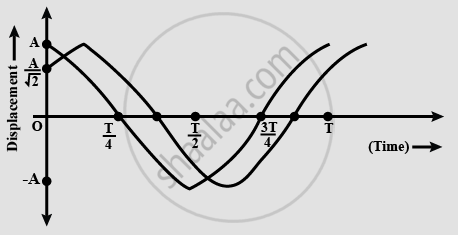Advertisements
Advertisements
Question
A particle performing linear S.H.M. has the maximum velocity of 25 cm/s and maximum acceleration of 100 cm/ m2. Find the amplitude and period of oscillation. (π = 3.142)
Solution
In S.H.M the velocity is given as
Velocity, `v = A w cos wt,` where w is angular frequency and A is amplitude
Maximum velocity `vm = A w [therefore cos wt = 1]`
Acceleration `= -Aw^2 sin wt`
Maximum acceleration `a_m = |-A w^2| = Aw^2 (therefore sinw^2t = 1)`
`a_m = 100 cm//s^2, v_m = 25 cm//s`
`Aw = 25` ....(i)
`Aw^2 = 100` .....(ii)
Dividing (ii) by (i) `(Aw^2)/(Aw) = 100/25`
w = 4
Time period, T = `(2≠)/w`
`= (2xx3.14)/4`
`T = 1.57 sec`
from 1 wa = 25
a = `25/4 = 6.25 `cm
APPEARS IN
RELATED QUESTIONS
A particle performing linear S.H.M. has a period of 6.28 seconds and a pathlength of 20 cm. What is the velocity when its displacement is 6 cm from mean position?
Define linear S.H.M.
The maximum velocity of a particle performing linear S.H.M. is 0.16 m/s. If its maximum acceleration is 0.64 m/s2, calculate its period.
Two particles perform linear simple harmonic motion along the same path of length 2A and period T as shown in the graph below. The phase difference between them is ___________.

Obtain the differential equation of linear simple harmonic motion.
A particle executing linear S.H.M. has velocities v1 and v2 at distances x1 and x2 respectively from the mean position. The angular velocity of the particle is _______
From differential equation of linear S.H.M., obtain an expression for acceleration, velocity and displacement of a particle performing S.H.M.
In SI units, the differential equation of an S.H.M. is `("d"^2"x")/("dt"^2)` = − 36x. Find its frequency and period.
A body of mass m performs linear S.H.M. given by equation, x = P sin cot + Q sin`(omega"t" + pi/2)`. The total energy of the particle at any instant is ______.
A particle performing Linear S.H.M. has a maximum velocity 25 cm/sand maximum acceleration 100 cm/s2. Find the period of oscillations.
What is the rotational analogue of Newton's second law of motion?
The speeds of a particle performing linear SHM are 8 units and 6 units at respective displacements of 6 cm and 8 cm. Find its period and amplitude.
A spring balance has a scale that reads from 0 to 50 kg. The length of the scale is 20 cm. A body suspended from this balance, when displaced and released osillates with a period of 0.6 sec. What is the weight of the body?
